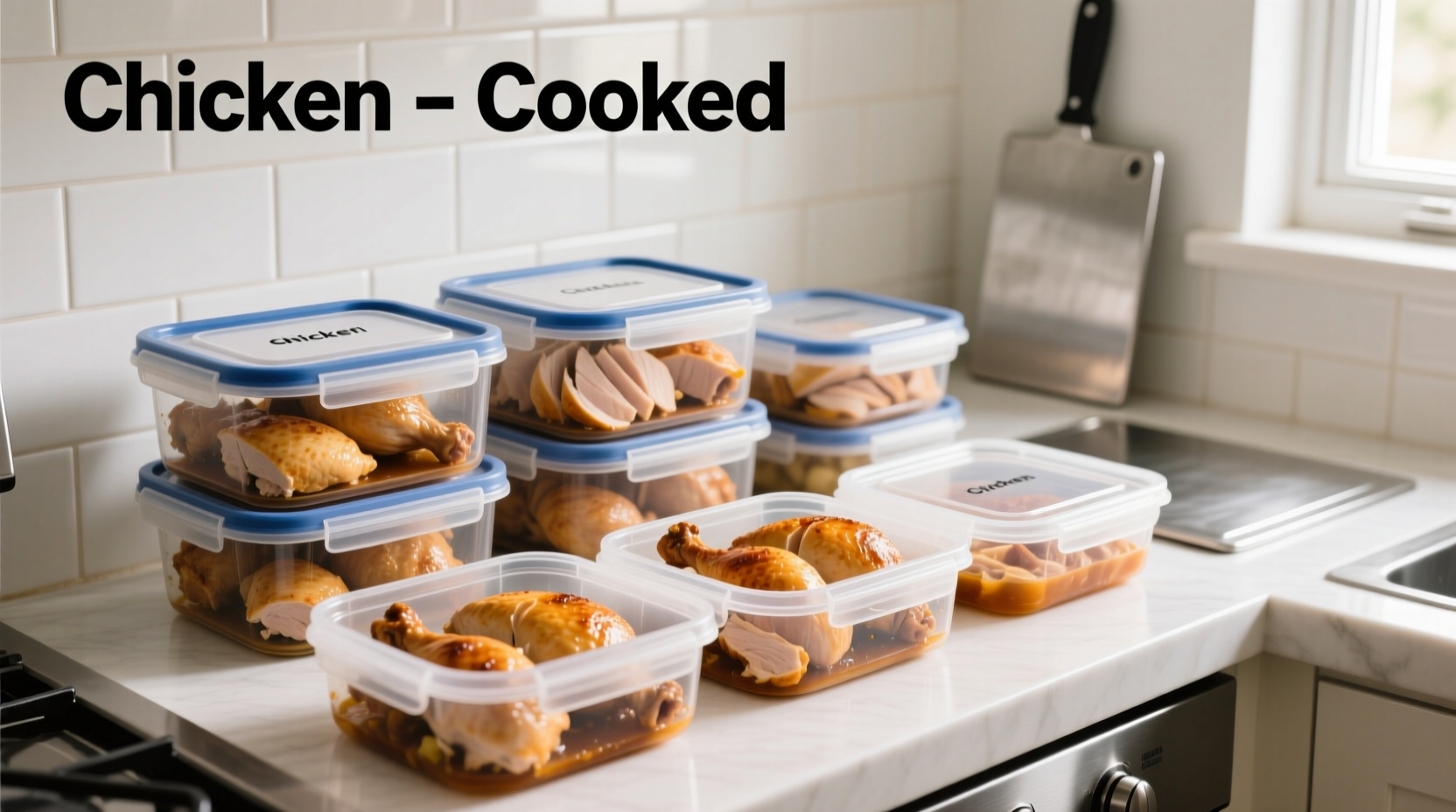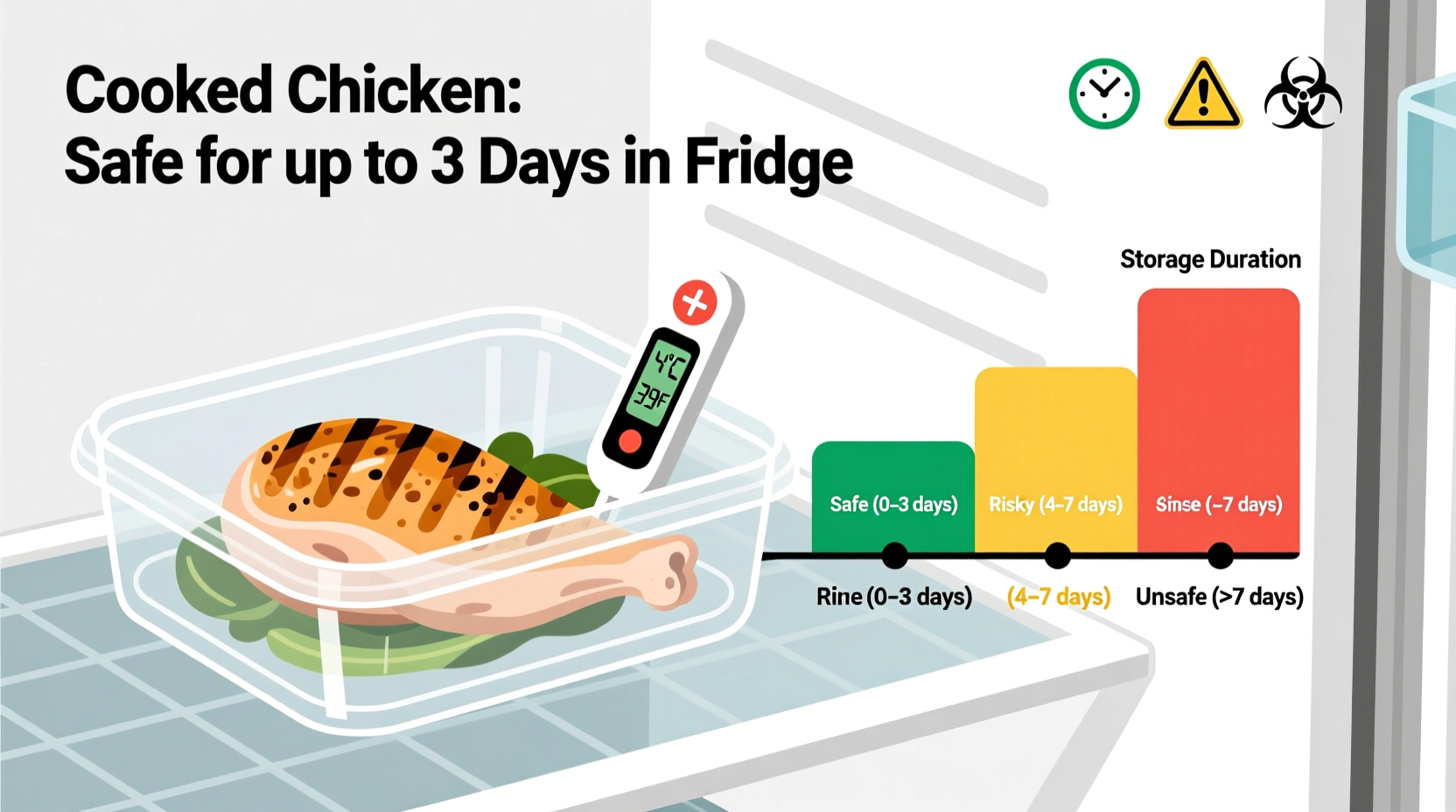Ever found yourself staring at last night's roast chicken wondering if it's still safe to eat? You're not alone. Proper food storage prevents both foodborne illness and unnecessary waste. Getting this right matters more than you might think - according to the CDC, Salmonella and Campylobacter from improperly stored poultry cause nearly 1 million foodborne illnesses annually in the United States.
Why the 3-4 Day Rule Exists
The USDA's 3-4 day recommendation isn't arbitrary. Bacteria like Staphylococcus aureus and Listeria monocytogenes begin multiplying rapidly after this timeframe, even in properly refrigerated conditions. FoodSafety.gov, a collaboration between USDA and FDA, confirms this window applies to all cooked poultry products including chicken breasts, thighs, and whole roasted birds.
Factors That Shorten Cooked Chicken's Shelf Life
Not all cooked chicken lasts the full 4 days. These conditions reduce safe storage time:
- Temperature fluctuations - Opening the fridge frequently raises internal temperature
- Improper cooling - Leaving chicken at room temperature longer than 2 hours (1 hour if above 90°F)
- Contaminated containers - Using non-airtight or previously used storage containers
- Added ingredients - Sauces or gravies containing dairy can spoil faster
| Storage Condition | Maximum Safe Days | Key Risk Factor |
|---|---|---|
| Properly sealed container at 40°F or below | 4 days | Standard bacterial growth |
| Left in original takeout container | 2-3 days | Non-airtight packaging |
| Cut into small pieces | 2-3 days | Increased surface area for bacteria |
| With creamy sauces | 2 days | Dairy accelerates spoilage |
Proper Storage Techniques That Maximize Freshness
Follow these evidence-based methods to get the most from your leftovers:
- Cool rapidly - Divide large portions into shallow containers (no deeper than 2 inches) to cool faster
- Seal airtight - Use containers with tight-fitting lids or vacuum sealers to prevent moisture loss
- Label everything - Note cooking date with marker directly on container
- Store strategically - Place in main refrigerator compartment, not door shelves where temperature fluctuates
A 2023 study published in the Journal of Food Protection found that vacuum-sealed cooked chicken maintained safety for the full 4 days 97% of the time, compared to 78% for standard containers. This demonstrates how proper storage technique directly impacts safety margins.

Warning Signs Your Chicken Has Spoiled
Don't rely solely on dates - your senses provide critical safety information. Discard chicken showing any of these characteristics:
- Visual changes - Grayish color, mold spots, or slimy film on surface
- Odor - Sour, ammonia-like, or sulfuric smell (even if only noticeable when heated)
- Texture - Sticky or tacky surface when touched
- Taste - Any off flavor (though you shouldn't need to taste to determine spoilage)
When in doubt, throw it out. The USDA emphasizes that harmful bacteria don't always produce noticeable changes in food. Foodborne illness from spoiled chicken can cause symptoms including vomiting, diarrhea, and fever that may last 4-7 days.
Freezing Cooked Chicken for Longer Storage
For extended storage beyond 4 days, freezing is your best option:
- Properly frozen cooked chicken remains safe indefinitely
- For best quality, consume within 4 months
- Thaw overnight in refrigerator - never at room temperature
- Reheat to internal temperature of 165°F (74°C)
Common Questions About Cooked Chicken Storage
Can I eat cooked chicken after 5 days in the refrigerator?
No, USDA guidelines state cooked chicken should be consumed within 3-4 days. After day 4, bacterial growth increases significantly even when refrigerated properly. Consuming chicken stored beyond this timeframe increases risk of foodborne illness.
Does reheating cooked chicken extend its safe storage time?
No, reheating does not reset the 3-4 day safety window. Each time you reheat and then re-refrigerate cooked chicken, you accelerate bacterial growth. Only reheat the portion you plan to eat immediately.
How long does cooked chicken last in the fridge after being frozen?
Once thawed in the refrigerator, cooked chicken should be eaten within 3-4 days regardless of its previous frozen state. The 3-4 day countdown begins after thawing, not from the original cooking date.
Is it safe to eat cooked chicken that smells slightly off?
No. Even a slightly off odor indicates bacterial growth that may produce harmful pathogens. Trust your nose - if it smells unusual in any way, discard the chicken immediately. Harmful bacteria don't always produce noticeable odors, but when they do, it's a clear warning sign.
What's the best container for storing cooked chicken in the refrigerator?
Airtight glass or BPA-free plastic containers with secure lids provide optimal protection. Glass containers maintain temperature better during storage and don't absorb odors. For best results, fill containers no more than 2 inches deep to ensure rapid, even cooling throughout the chicken.











 浙公网安备
33010002000092号
浙公网安备
33010002000092号 浙B2-20120091-4
浙B2-20120091-4